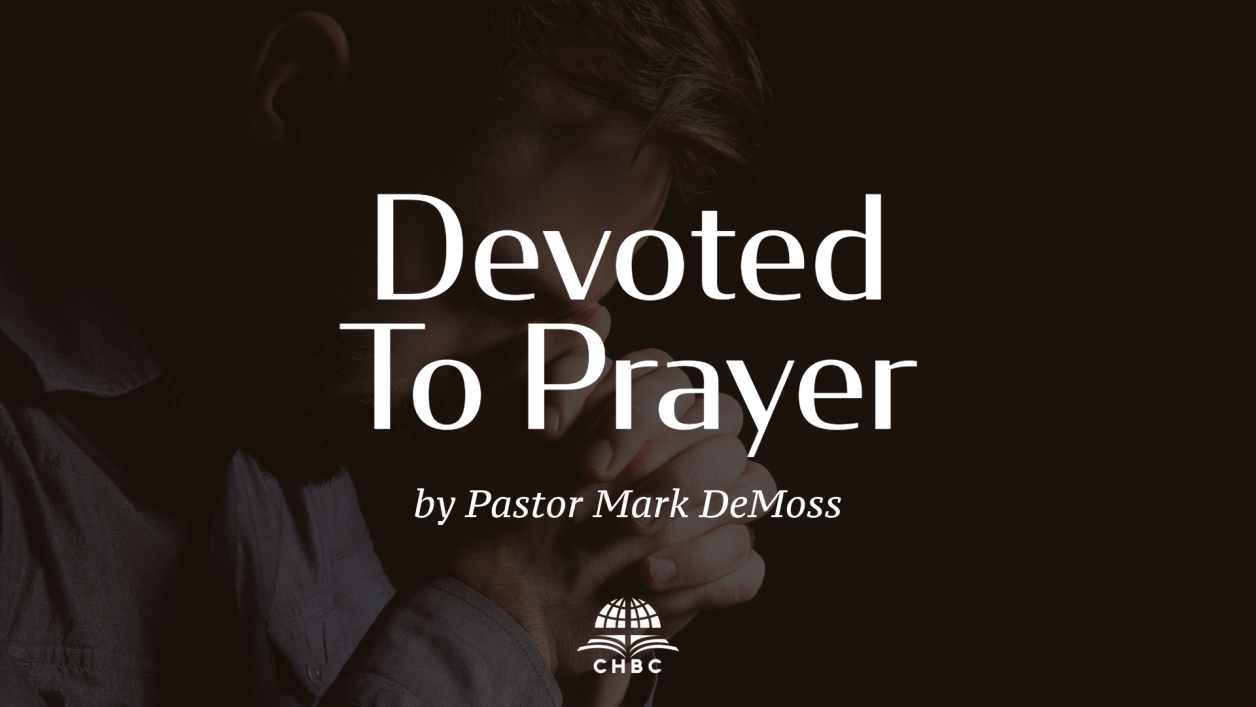
In our resource center at CHBC we offer a book you should get. It is entitled, Praying the Bible, by Donald S. Whitney, professor of Biblical Spirituality at Midwestern Baptist Theological Seminary. Every one of us can grow in respect to our prayer lives. If you want a simple, straightforward, and practical help for your prayer life, this is it.
The early church was devoted to prayer (Acts 2:42). We often treat prayer as an afterthought or a last resort. Prayer for a believer should be like water to a fish. If we are not immersed in a posture of “praying without ceasing” (1 Thess. 5:17), we should be suffering the effects. In fact, sadly, we may be suffering from the effects of our prayerlessness, but we have adapted.
Don Whitney wrote an article recently for Crossway in which he gives ten things we need to know about prayer. Here are the ten things he mentions, as well as a link to the entire article (https://www.crossway.org/articles/10-things-you-should-know-about-prayer/).
- Prayer is talking to God. We have sometimes defined prayer at CHBC as pouring our hearts out to God. The point is that there are many deep, theologically nuanced explanations of prayer that are important. But there is also no reason to complicate what we are talking about when it comes to prayer. Prayer is talking to God.
- Prayer is acceptable to God only in Jesus’ name. John 14:6, “I am the way, the truth, and the life, no one comes to the Father except by Me.” We often apply that verse in the context of evangelism. But it is a holistic truth. There is no access to God apart from who Jesus is and what Jesus has done for us on the cross and through the resurrection.
- Prayer, apart from a relationship to God through Jesus, is heard—but not with a view to answering. Have you ever heard this question, or maybe had this question yourself, “Does God hear the prayers of an unbeliever?” God hears everything. But he does not hear with a view to answering unless we are in a relationship with Him through Christ. See Prov. 28:9; John 14:6; Prov. 15:8.
- Prayer is a lifelong desire in all those indwelled by the Holy Spirit. Rom. 8:15 tells us that when the Holy Spirit indwells us, we cry out ‘Abba, Father.’ We become children of God and have a desire to talk with our heavenly Father that never goes away.
- The Holy Spirit helps believers pray. Have you found yourself unable to determine what you even need to pray? You do not need to fret. Romans 8:26-27 tells us, “In the same way the Spirit also helps our weakness; for we do not know how to pray as we should, but the Spirit Himself intercedes for us with groanings too deep for words; 27 and He who searches the hearts knows what the mind of the Spirit is, because He intercedes for the saints according to the will of God.”
- In the Bible, almost every prayer includes a reason why God should answer. In almost every example of prayer in the Bible, the individual praying appeals to God’s character, attributes, or promises on why there should be an answer to prayer. Do your prayers appeal to God’s being, nature, or promises?
- Prayer shaped by the words of the Bible solves many of the most common problems in prayer. This is where I would say, get Don’s book. It will show you the power and practice of praying the Bible. When you do this, you know you are praying according to God’s will, and you will pray for the same things you often pray about but in new and fresh ways every day. Turn to the Bible and turn the words of the Bible into your prayers.
- Jesus gave us a model for prayer. In Matthew 9 and Luke 11, Jesus gave us model prayer. We often call it the Lord’s Prayer. It is not intended to be the only way a Christian prayer, but it does include components that should be a part of our prayers. If you want to know if you are praying according to God’s design, use the components of this model prayer as a skeletal structure for your prayers.
- Prayer is both natural and learned. As noted above, the Spirit in us gives us a new innate desire to speak to our Heavenly Father. But we also know the Bible warns that we can ask wrongly. So, we need to learn God’s expectations on how His children are to approach Him and worship Him.
- Prayer should be practiced privately, with the family, and with the church. While we should not neglect a private prayer life, we also must not limit our time of prayer only when we are alone. Families, couples, and the church should find it a regular practice of praying together.
By His Grace and For His Glory,
Pastor Mark

